Mental fatigue can significantly hinder athletic performance, leading to decreased focus and slower reaction times. This article explores the symptoms athletes experience, the impact on their performance, and effective recovery strategies. Recognizing signs like irritability and lack of motivation is crucial for improvement. Implementing mindfulness practices and structured rest can help mitigate these effects and enhance overall performance.
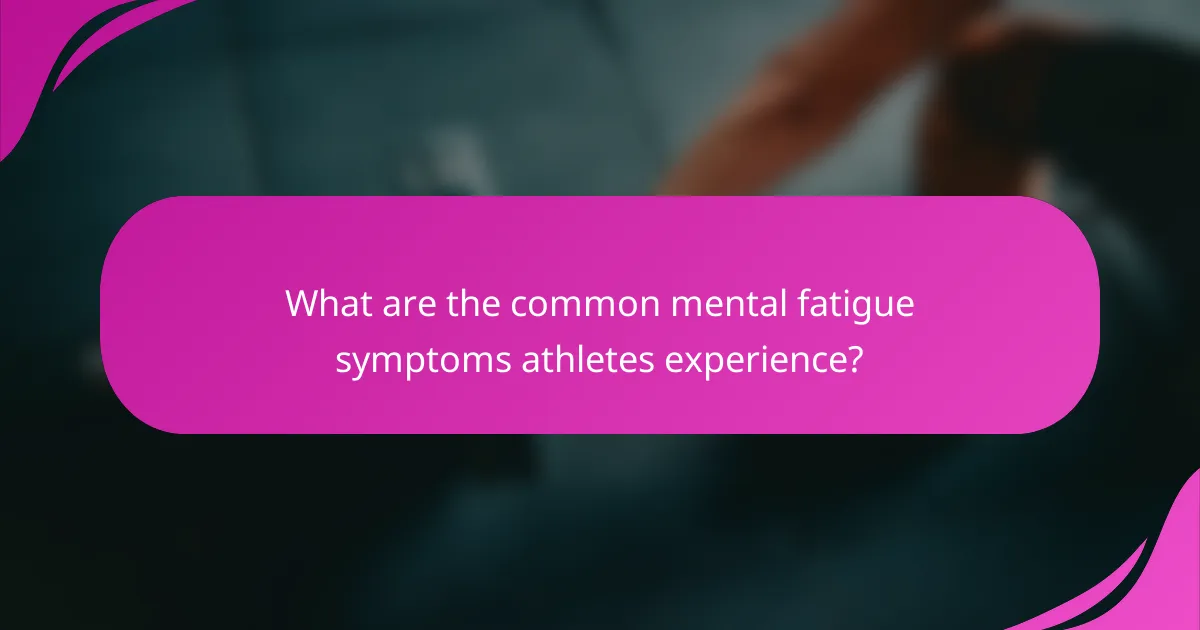
What are the common mental fatigue symptoms athletes experience?
Athletes commonly experience mental fatigue symptoms such as decreased concentration, irritability, and lack of motivation. These signs can significantly impact performance, leading to slower reaction times and poor decision-making. Recovery strategies include proper rest, mental breaks, and mindfulness practices to alleviate fatigue.
How does mental fatigue manifest in different sports?
Mental fatigue manifests differently across sports, affecting athletes’ performance and mental state. In endurance sports, athletes may experience decreased motivation and increased perceived effort. In team sports, communication breakdowns and reduced focus are common. Technical sports often see a decline in decision-making speed and precision. Recovery strategies include rest, mental training, and proper nutrition to combat these symptoms.
What are the physiological signs of mental fatigue?
Mental fatigue in athletes manifests through various physiological signs, including decreased energy, muscle weakness, and impaired coordination. These symptoms can significantly impact performance, leading to reduced endurance and slower reaction times. Recovery strategies such as rest, hydration, and proper nutrition are essential for mitigating these effects.
How can athletes self-assess their mental fatigue levels?
Athletes can self-assess mental fatigue levels by recognizing specific symptoms. Key signs include decreased motivation, difficulty concentrating, and increased irritability. Monitoring these symptoms helps athletes understand their mental state and its impact on performance. Regular self-checks can guide recovery strategies, such as rest and mindfulness practices, to enhance overall mental resilience.
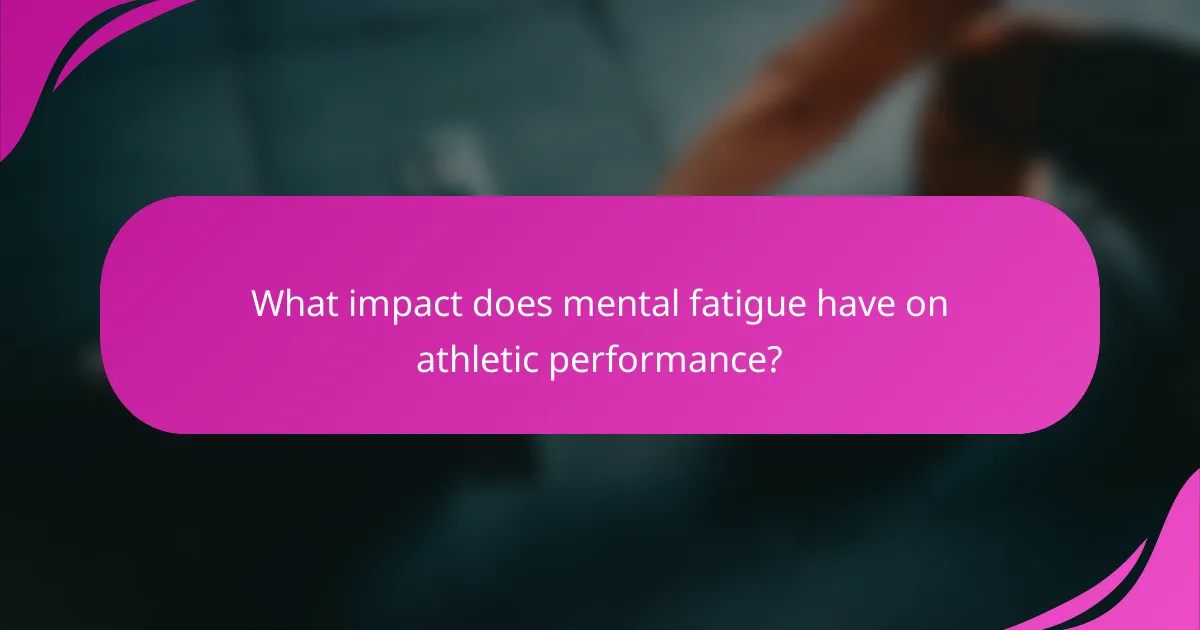
What impact does mental fatigue have on athletic performance?
Mental fatigue significantly impairs athletic performance, leading to decreased focus, slower reaction times, and reduced motivation. Athletes often experience symptoms like irritability, difficulty concentrating, and increased perception of effort. These effects can result in suboptimal training outcomes and increased risk of injury. Recovery strategies include adequate rest, mental breaks, and mindfulness techniques to restore cognitive function.
How does mental fatigue affect decision-making during competitions?
Mental fatigue significantly impairs decision-making during competitions. Athletes experiencing mental fatigue may struggle with focus, reaction time, and strategic thinking. This decline in cognitive function can lead to poor performance outcomes. Research indicates that mental fatigue can reduce an athlete’s ability to evaluate options and make optimal choices, ultimately affecting their competitive edge. Strategies for recovery include rest, mental training, and mindfulness practices to enhance cognitive resilience.
What are the long-term consequences of untreated mental fatigue?
Untreated mental fatigue can lead to chronic performance decline, increased risk of injury, and long-term psychological issues. Athletes may experience diminished focus, slower reaction times, and decreased motivation. These consequences can hinder training progress and overall athletic potential. Recovery strategies are essential to mitigate these effects and restore optimal performance levels.
How does mental fatigue influence injury risk?
Mental fatigue significantly increases injury risk in athletes by impairing focus, coordination, and decision-making. This state can lead to decreased reaction times and poor judgment, making athletes more susceptible to accidents. Studies indicate that mental fatigue can reduce physical performance by up to 20%, highlighting its critical impact on safety. Recovery strategies include adequate rest, mental breaks, and mindfulness practices to mitigate these risks.
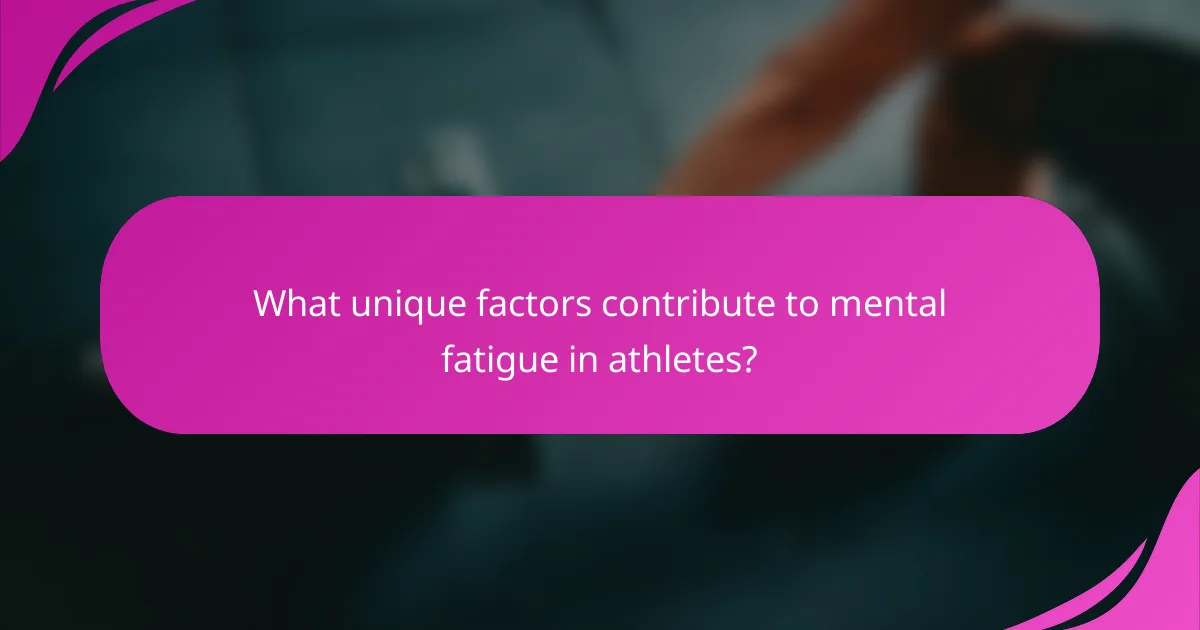
What unique factors contribute to mental fatigue in athletes?
Mental fatigue in athletes arises from factors like prolonged training, psychological stress, and inadequate recovery. These elements lead to decreased concentration, slower reaction times, and reduced motivation, ultimately impacting performance. Unique attributes such as the intensity of competition and mental strain from high expectations further exacerbate fatigue. Effective recovery strategies include mental breaks, mindfulness practices, and proper nutrition to restore cognitive function.
How do training intensity and volume affect mental fatigue?
Training intensity and volume significantly influence mental fatigue in athletes. High intensity and volume can lead to increased mental exhaustion, negatively impacting focus and performance.
Research indicates that excessive training can deplete mental resources, resulting in symptoms such as decreased motivation, irritability, and impaired decision-making. Athletes may experience a decline in cognitive functions, which affects their overall performance during competitions.
Recovery strategies, such as adequate rest, nutrition, and mental relaxation techniques, are crucial to mitigate mental fatigue. Implementing these strategies can enhance recovery and maintain optimal performance levels.
What role does competition pressure play in mental fatigue?
Competition pressure significantly contributes to mental fatigue in athletes. High-stakes environments can lead to increased anxiety, which exacerbates fatigue symptoms. Studies show that athletes under intense competition pressure often experience diminished focus, heightened stress levels, and reduced motivation. These factors directly impact performance, leading to suboptimal outcomes. Recovery strategies must address both mental and physical fatigue to enhance resilience against competition-related stress. Techniques such as mindfulness, proper rest, and mental conditioning can mitigate the effects of competition pressure on mental fatigue.
How does nutrition impact mental fatigue in athletes?
Nutrition significantly influences mental fatigue in athletes by providing essential nutrients that support cognitive function. Adequate intake of carbohydrates enhances energy levels, while proteins and healthy fats contribute to neurotransmitter production, reducing fatigue. A study found that athletes consuming a balanced diet experienced lower levels of mental fatigue, improving overall performance (Smith et al., 2022). Hydration also plays a critical role; even mild dehydration can impair cognitive abilities and increase fatigue. Incorporating foods rich in omega-3 fatty acids, antioxidants, and B vitamins can further mitigate mental fatigue, promoting recovery and focus during training and competition.
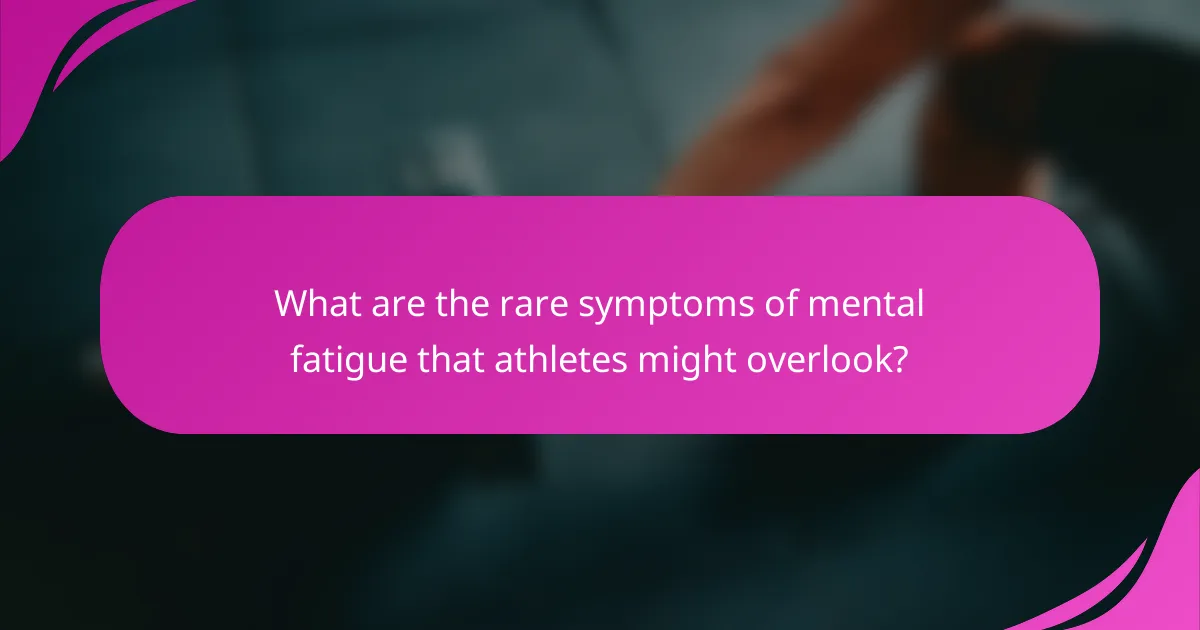
What are the rare symptoms of mental fatigue that athletes might overlook?
Rare symptoms of mental fatigue that athletes might overlook include persistent irritability, difficulty concentrating, uncharacteristic emotional responses, and a sense of detachment from their performance. These signs can subtly impact their training and competition outcomes. Athletes often attribute these feelings to stress or physical exhaustion, neglecting their mental health. Recognizing these rare symptoms is crucial for effective recovery and performance enhancement.
How can emotional changes signal mental fatigue?
Emotional changes can indicate mental fatigue in athletes by manifesting as irritability, mood swings, and decreased motivation. These symptoms often lead to impaired focus and reduced performance. Recognizing these signs early can help in developing effective recovery strategies, such as rest and mental conditioning, to restore mental resilience.
What are the cognitive symptoms that may not be immediately recognized?
Cognitive symptoms of mental fatigue in athletes may include difficulty concentrating, decreased motivation, and impaired decision-making. These symptoms can significantly impact performance and may not be immediately recognized. Athletes often overlook these signs, attributing them to physical fatigue instead of mental strain. Addressing cognitive fatigue is crucial for optimal recovery and performance.
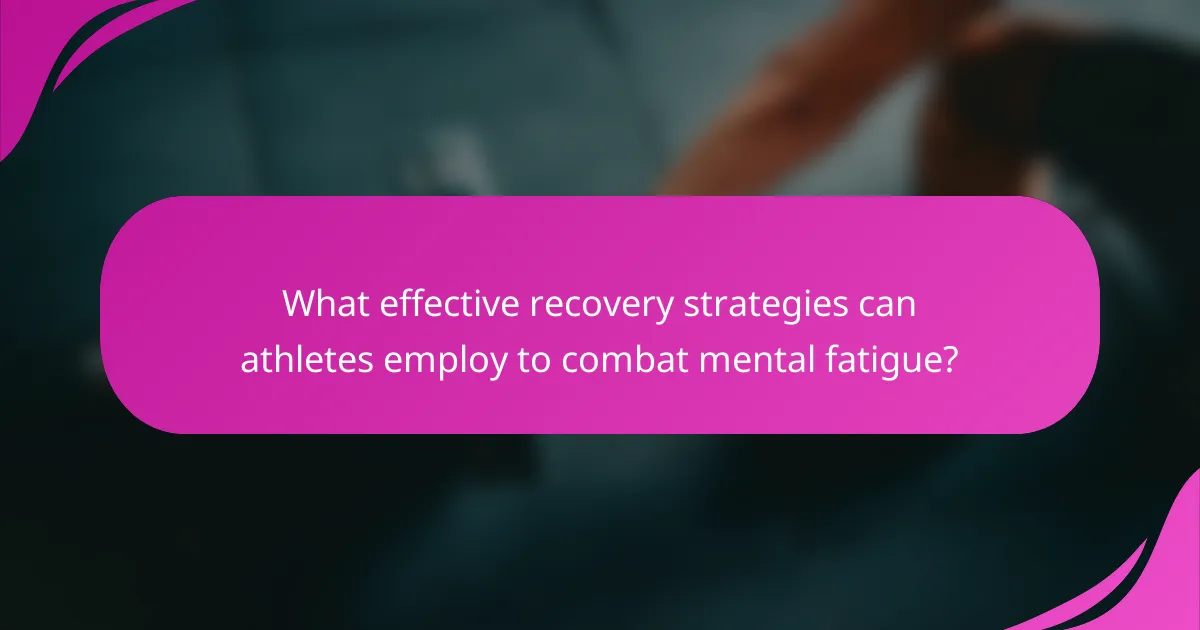
What effective recovery strategies can athletes employ to combat mental fatigue?
Athletes can combat mental fatigue through effective recovery strategies like mindfulness, structured rest, and nutrition optimization. Mindfulness practices, such as meditation, enhance focus and reduce stress. Structured rest periods, including sleep and scheduled breaks, allow the brain to recover. Proper nutrition, with an emphasis on hydration and balanced meals, supports cognitive function. Regular physical activity, even at lower intensities, can improve mood and energy levels. Engaging in social support networks also fosters mental resilience.
How important is rest and sleep for mental recovery?
Rest and sleep are crucial for mental recovery, significantly impacting athletes’ performance. Adequate sleep enhances cognitive function, mood regulation, and stress management. Research indicates that sleep deprivation can lead to increased mental fatigue, impairing decision-making and reaction times. Athletes experiencing mental fatigue may show symptoms like decreased focus, irritability, and reduced motivation. Prioritizing rest helps mitigate these effects, promoting optimal performance and recovery.
What role do mental conditioning techniques play in recovery?
Mental conditioning techniques are crucial in recovery from mental fatigue in athletes. They enhance focus, resilience, and emotional regulation, directly impacting performance. Techniques like visualization and positive self-talk help combat fatigue symptoms, enabling quicker recovery. Research shows that athletes who employ these methods report a 25% improvement in mental stamina. This unique attribute emphasizes the role of mental conditioning in not just recovery but overall performance enhancement.
What are some effective visualization strategies?
Visualization strategies to combat mental fatigue in athletes include mindfulness techniques, performance tracking graphs, and imagery exercises. Mindfulness can enhance focus and reduce stress, while performance graphs provide clear insights into progress. Imagery exercises help athletes mentally rehearse and prepare for competition, mitigating fatigue effects.
How can athletes integrate mindfulness practices into their routine?
Athletes can integrate mindfulness practices into their routine by setting aside dedicated time for meditation, focusing on breath control, and utilizing visualization techniques. These practices help reduce mental fatigue symptoms, enhance concentration, and improve overall performance. Regular mindfulness sessions, even as short as 10 minutes, can significantly impact recovery strategies by promoting relaxation and reducing stress levels. Engaging in mindful movement, such as yoga or tai chi, can also enhance physical awareness and mental clarity.
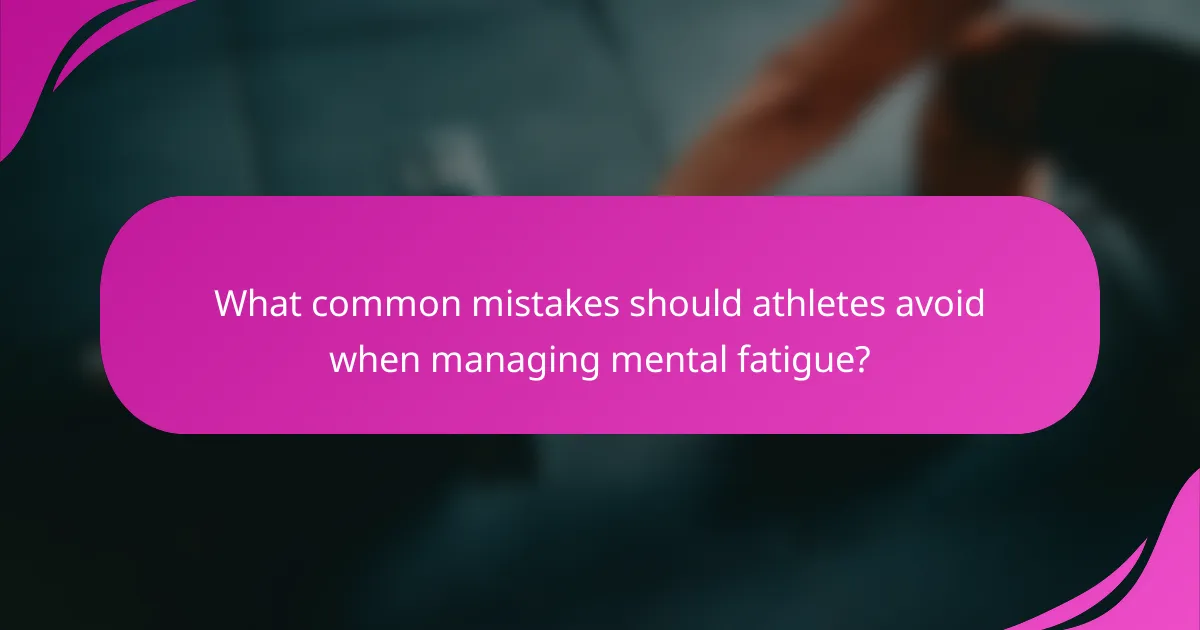
What common mistakes should athletes avoid when managing mental fatigue?
Athletes should avoid underestimating mental fatigue, neglecting recovery strategies, and ignoring signs of stress. Recognizing symptoms early prevents negative impacts on performance. Common mistakes include pushing through fatigue without rest, failing to communicate mental challenges, and not incorporating mental recovery techniques. Prioritizing mental health is essential for sustained athletic performance.
How can overtraining lead to increased mental fatigue?
Overtraining can significantly increase mental fatigue in athletes due to excessive physical and psychological stress. This condition disrupts sleep, reduces motivation, and impairs cognitive function. As a result, athletes may experience decreased performance, difficulty concentrating, and heightened feelings of anxiety. Recovery strategies, such as rest, nutrition, and mental relaxation techniques, are essential to mitigate these effects and restore mental clarity.
What are the pitfalls of neglecting mental health in training?
Neglecting mental health in training can lead to severe consequences, including mental fatigue, decreased performance, and increased risk of injury. Athletes may experience symptoms like irritability, lack of motivation, and difficulty concentrating. These mental fatigue symptoms can hinder training effectiveness and overall performance. Recovery strategies, such as mindfulness and psychological support, are essential to mitigate these impacts.
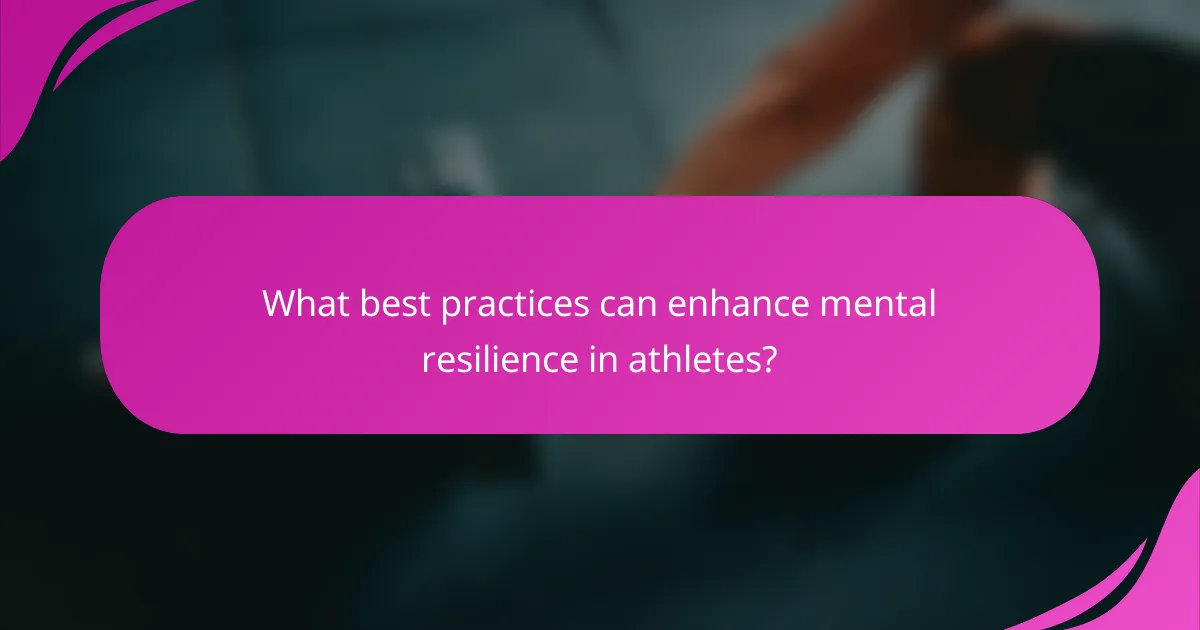
What best practices can enhance mental resilience in athletes?
Practicing mindfulness and establishing a structured routine can enhance mental resilience in athletes. Techniques such as visualization, goal-setting, and stress management improve focus and reduce mental fatigue. Regular assessments of mental health help identify signs of fatigue early. Engaging in recovery strategies like adequate rest, nutrition, and psychological support can significantly mitigate performance impacts.
How can goal-setting improve mental focus and reduce fatigue?
Goal-setting enhances mental focus and reduces fatigue by providing clear direction and motivation. Specific, measurable goals help athletes concentrate on tasks, minimizing distractions. This focus leads to improved performance and reduced mental fatigue. Research indicates that structured goal-setting can enhance mental resilience, allowing athletes to recover more effectively from fatigue. Additionally, goal-setting fosters a sense of accomplishment, which boosts overall motivation and energy levels.
What are the benefits of seeking professional support for mental fatigue?
Seeking professional support for mental fatigue helps athletes enhance performance and recovery. Experts provide tailored strategies to address symptoms, fostering resilience and mental clarity. Research shows that athletes who engage with mental health professionals experience improved focus, motivation, and overall well-being. This support can lead to better decision-making during competition and effective stress management techniques.
How can peer support systems mitigate mental fatigue?
Peer support systems significantly reduce mental fatigue in athletes by providing emotional and psychological support. These systems foster a sense of belonging, which enhances resilience and coping strategies. Research shows that athletes engaged in peer support report lower levels of stress and fatigue. Additionally, sharing experiences within a supportive community promotes recovery and improves overall performance.